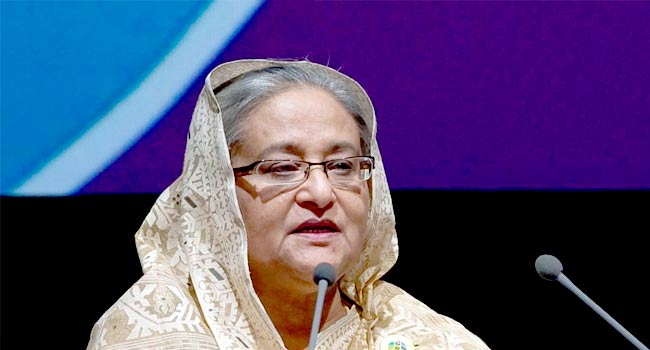In the recent past, the Sheikh Hasina regime in Bangladesh has been very clear in its approach regarding the Rohingya immigrants. It sees the Rohingya Muslims as a a security threat and has also expressed its keenness for their repatriation. Bangladesh’s actions too have been aimed at avoiding the security threat posed by the Rohingya immigrants.
Now, as per a latest HT report, the Hasina regime in Bangladesh has mandated education for Rohingya children in Burmese, English or Rohingya language. Therefore, Bangladesh is deliberately avoiding imparting education to the Rohingya children in Bengali. It is not very difficult to understand the rationale behind this move. The Bangladesh independence movement was based upon the linguistic issue. Bengali language is the basis of Bangladeshi identity and nationalism. Therefore, if education to Rohingya Muslims is imparted in the Bengali language, then it will create a major issue for Bangladesh. Future Rohingya generations will be able to gel in the Bangladeshi society, making their identification and eventual repatriation a difficult process.
According to a Survey conducted by an international group, Translators Without Borders, Rohingya remains the preferred spoken language of the Rohingya Muslims. However, they understand spoken Bengali better than spoken Burmese and English. It is in such circumstances that the Sheikh Hasina government has taken the decision of not imparting education in Bengali language to Rohingya immigrants. If Rohingya Muslims in Bangladesh have already started understanding Bengali better than other languages, then that in itself creates a major issue for Bangladesh. Imparting education in Bengali would have proved a suicidal step pushing Rohingya immigrants towards integration with the Bangladeshi society.
As stated earlier, the Sheikh Hasina regime in Bangladesh has been pretty conscious of the security threat posed by the Rohingya immigrants in the recent past. Only a couple of months ago, it was reported that Bangladesh government got a hint about how some NGOs were repeatedly abetting Rohingya immigrants not to leave Bangladesh, which has been a major reason behind Bangladesh’s failure to repatriate the Rohingya immigrants. The government therefore decided to withdraw 41 NGOs from the Rohingya camps for their wrongdoings. In another report, it also came to light that Bangladesh has banned mobile phone access in the Rohingya camps in the country. Bangladesh Telecom Regulatory Commission (BTRC) has reportedly directed all mobile phone operators to stop selling SIM cards to Rohingyas and ensure that mobile phones are not used by them.
Last month, it was reported that the Bangladesh government had moved to relocate the Rohingya to the flood-prone Bhasan Char — a Bay of Bengal island hours by boat from the mainland — to ease overcrowding in its camps at Cox’s Bazar. “We want to start relocation by early next month,” Mahbub Alam Talukder, the Relief and Repatriation Commission chief based in Cox’s Bazar, told Reuters, adding that “the refugees will be shifted in phases.“Our officials are compiling the lists of the refugees who are willing to move there,” he said, adding that as many as 7,000 refugees had by Saturday agreed to shift. It is important to mention here that Bangladesh’s overcrowded Cox’s Bazaar has witnessed a spike in crime rates as the there is a simmering anger brewing in the locals against the Rohingya Muslims, and this is why the government decided to relocate the Rohingya Muslims.
Bangladesh Prime Minister, Sheikh Hasina has even publicly acknowledged that the presence of Rohingya immigrants is a threat to Bangladesh’s security. Only few days ago, she said, “In terms of regional security, I would like to say that more than 1.1 million Rohingya citizens of Myanmar fled to Bangladesh in the face of persecution and they are a threat to the security not only for Bangladesh but also for the region.” In such circumstances, the Sheikh Hasina government remains keen on getting the Rohingya Muslims repatriated.
However, its efforts to initiate repatriation have not been successful till now. Therefore, it is only appropriate that the Hasina government continues to avoid integration of Rohingya Muslims with the mainstream Bangladeshi society. Had Bangladesh chosen to educate Rohingya children in Bengali that would have led to an entire future generation of Rohingya immigrants getting gelled in the Bangladeshi society making their repatriation an almost impossible prospect. This explains the rationale behind the choice of linguistics when it comes to educating the Rohingya children.
